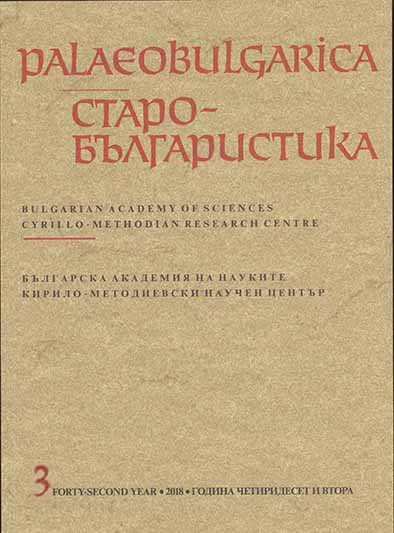Езикови особености на превода на Исихиевите тълкувания по преписа им в Иван-Александровия Песнивец: към въпроса за времето и мястото на възникване на превода (Част втора)
Linguistic Peculiarities of the Translation of Hesychius’ Commentary in the John Alexander Copy of the Pesnivets: on the Question of Time and Place of the Origin of the Translation (Second Part)
Author(s): Maria Spasova, Cvetomira DanovaSubject(s): History, Language studies, Language and Literature Studies, Cultural history, Middle Ages
Published by: Кирило-Методиевски научен център при Българска академия на науките
Summary/Abstract: The article is dedicated to the study of the lexis of the Commentary to Ps 1:1–76:21 in the John Alexander Psalter of 1337. It examines on the lexical level whether the conclusions reached in the first part of the article (that the translation of the Commentary is of Old Bulgarian Origin and is to be dated to the late 9th – early 10th c. and that the text of this Psalter preserves a considerable part of the archaic Cyrillo-Methodian and Preslav features of the initial translation) can be corroborated by a lexical analysis. Yet, the main aim of the paper is to check whether there are grounds to attribute the translation of the Commentary to a specific Old Bulgarian man of letters for whom there are indisputable evidence and linguistic proofs testifying which particular translations or original writings are his work. The first group of words examined consists of 275 lexemes attested in the translation of the Commentary which are not found in the vocabulary of the Old Bulgarian manuscript canon. They are compared to the lexis of two text corpora: the first one includes texts (both original and translated) with known authorship and the second one consists of texts by anonymous translators. The largest number of those 275 lexemes are found in the works of Constantine of Preslav (50) and John the Exarch (50), in the Paraenesis by Ephrem the Syrian (56), the Pandects of Antioch (55), the short version of the Chrysorrhoas (Zlatostruy) Collection (54) and Tsar Simeon’s Miscellany (51). The second group of words consists of 434 lexemes attested in the Commentary which have up to 5 uses in the Old Bulgarian manuscript canon. The largest number of those 434 lexemes are found in the Codex Suprasliensis (259), the Psalterium Sinaiticum (153) and the Euchologium (109); in the works of Constantine of Preslav (185), John the Exarch (173), and Clement of Ohrid (140); in the Paraenesis by Ephrem the Syrian (246), the short version of the Chrysorrhoas (Zlatostruy) Collection (229), the Pandects of Antioch (221), Simeon’s Miscellany (205), the Scete Paterikon (172) and the Knyazhiy Izbornik (133). The results of the analysis of the two groups of lexemes coincide to a high degree. The general conclusions of the lexical investigation in Part Two not only strongly confirm the early Old Bulgarian origin of the translation of Hesychius’ Commentary, but also allow a tentative attribution to Constantine of Preslav or John the Exarch.
Journal: PALAEOBULGARICA / СТАРОБЪЛГАРИСТИКА
- Issue Year: 2018
- Issue No: 3
- Page Range: 33-70
- Page Count: 38
- Language: Bulgarian

